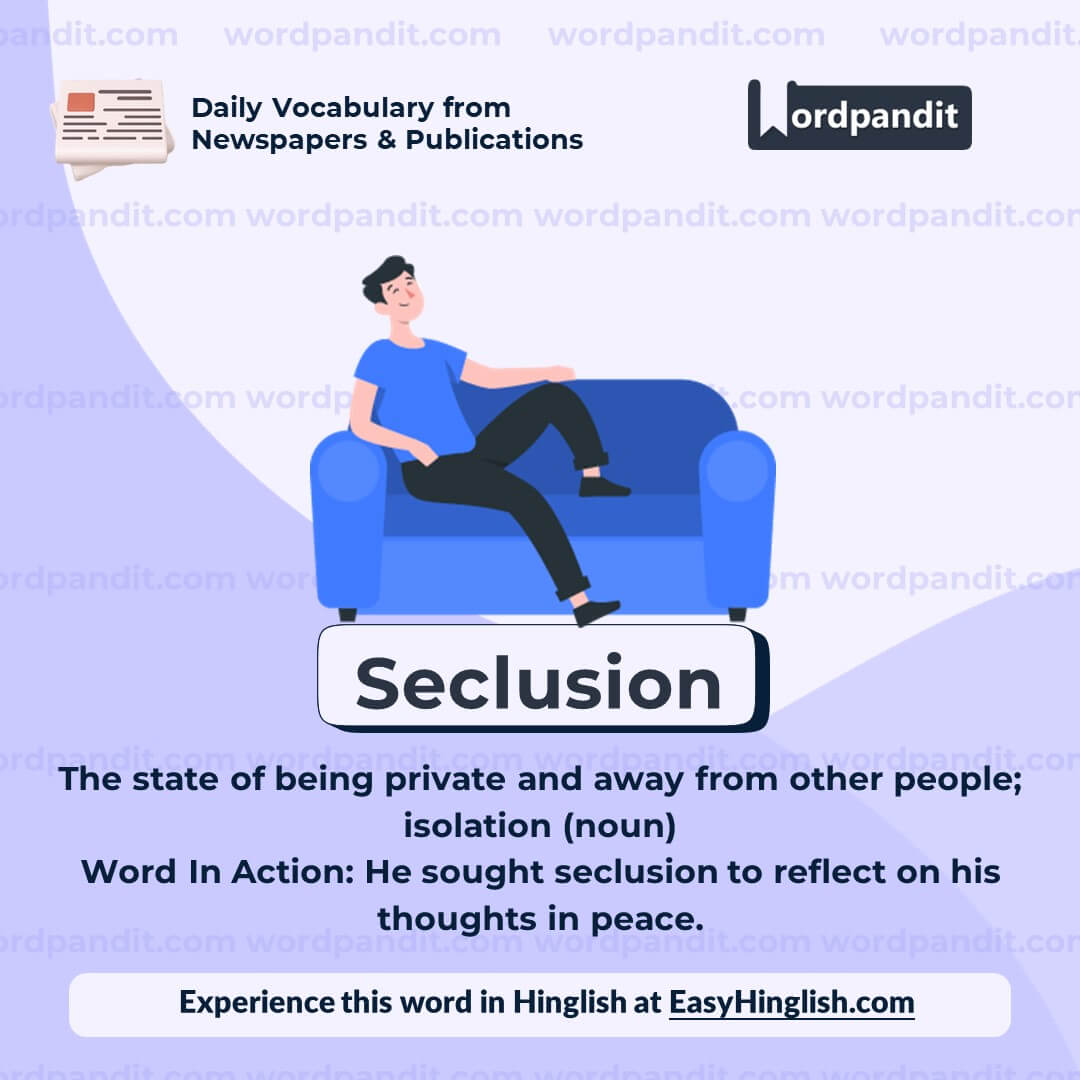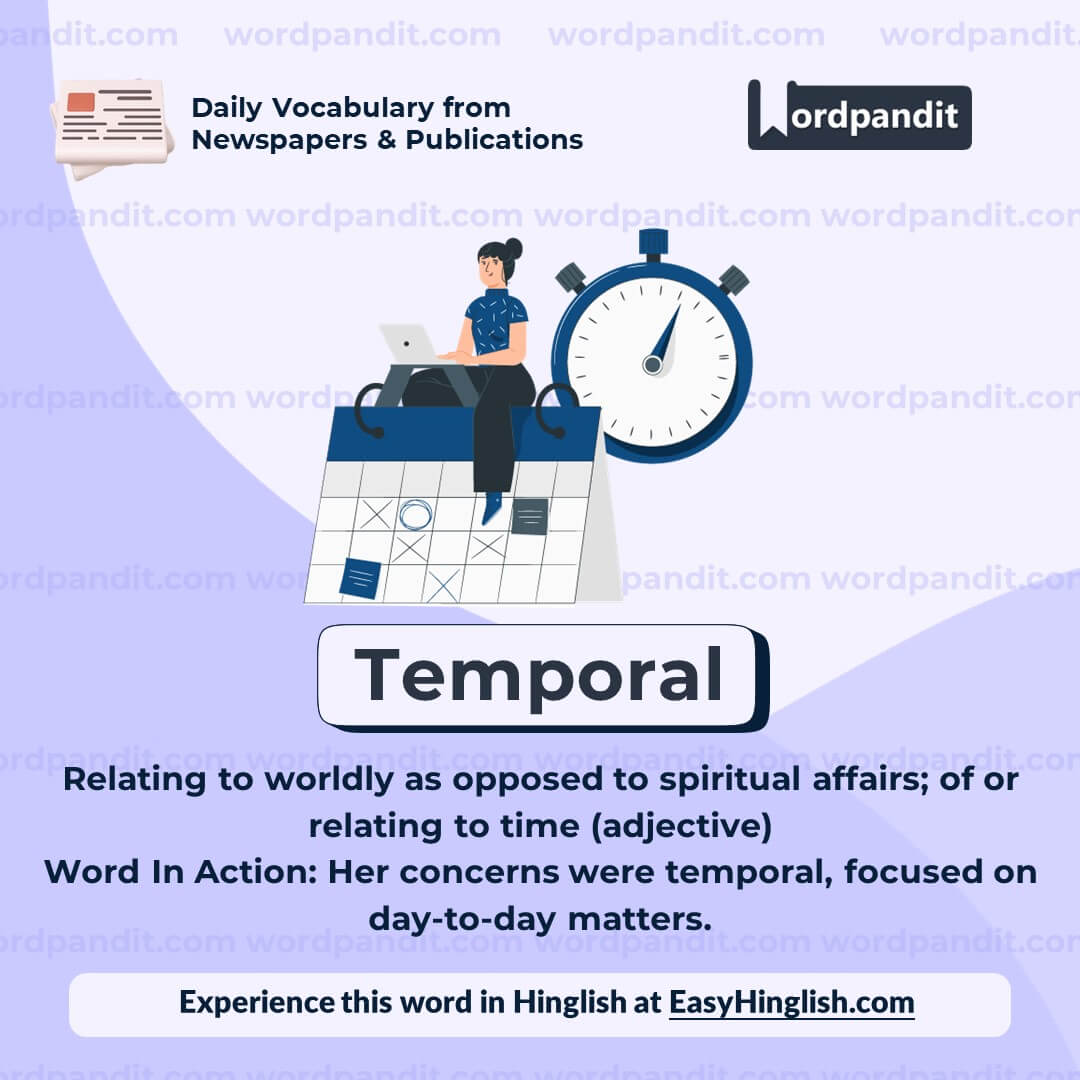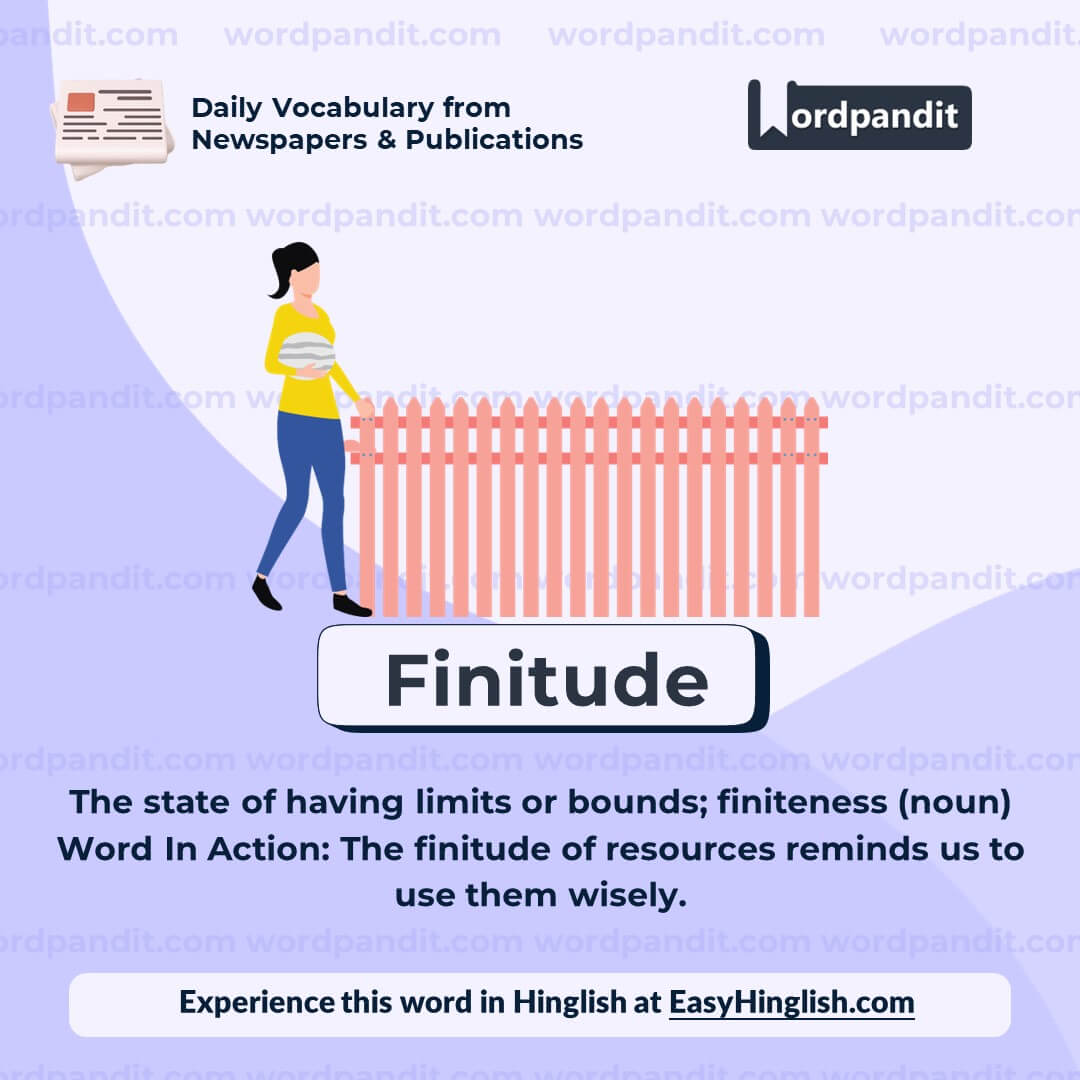Daily Vocabulary from International Newspapers and Publications
Expand Your Vocabulary with Wordpandit’s Global Vocabulary Hub
At Wordpandit, we are committed to helping you develop a truly global vocabulary by drawing from some of the most respected international publications. This section is designed to keep you ahead of the curve by introducing you to words that define global conversations and trends.
The Power of Global Sources
To help you think and communicate on a global scale, we curate vocabulary from renowned international sources, such as:
- The New York Times
- The Washington Post
- BBC
- The Guardian
- The Economist
- Scientific American
- Psychology Today
- And many more...
Stay Global, Stay Competitive
Our daily updates from international publications ensure you are consistently exposed to new words that reflect global news and developments, making sure your vocabulary is not only current but also globally relevant.
Enhance Your Global Perspective
Whether you’re preparing for international exams, aiming to excel in global business communication, or want to enhance your language skills for personal growth, Wordpandit offers the resources you need to thrive in a global context.
Effective Learning, Global Reach
Our learning methodology combines global examples, memory aids, and interactive activities, allowing you to internalize new words effectively and apply them in real-world scenarios.
Begin Your Global Vocabulary Journey Now!
Why Choose Wordpandit?
Practical Learning: Focus on words you'll actually encounter in real-world reading, enhancing your comprehension and communication skills.
Diverse Content: From current affairs to scientific breakthroughs, our varied sources expose you to vocabulary across multiple domains.
Effortless Integration: Make Wordpandit a part of your daily routine. Just a few minutes each day can significantly boost your lexicon over time.
Your Path to Vocabulary Mastery
- Visit our Daily Vocabulary section regularly
- Explore new words and their usage in context
- Practice incorporating these words into your own writing and speech
- Track your progress as your vocabulary expands
Start Your Journey Today
Embark on your vocabulary enhancement journey with Wordpandit. By consistently engaging with our daily posts, you'll build a robust vocabulary that serves you well in academic, professional, and personal contexts.
Remember, a word a day keeps linguistic limitations at bay. Make Wordpandit your daily companion in the quest for vocabulary excellence!
WORD-1: Seclusion
Context:
"Prominent public figures who are far from comfortable seclusion in so-called ivory towers. Historians occupy a central, privileged position for crafting and re-crafting shared meanings and political identities." - Aeon
Explanatory Paragraph:
Seclusion refers to a state of being isolated or away from the general public. It often connotes a sense of privacy or solitude, whether chosen willingly or imposed by circumstances. The term can apply to physical isolation or a metaphorical separation from mainstream society.
Meaning: The state of being private and away from other people; isolation (noun)
Pronunciation: sih-KLOO-shun
Difficulty Level: ⭐⭐ Beginner
Etymology: Derived from the Latin word "secludere," meaning "to shut off" or "to isolate."
Synonyms & Antonyms:
Synonyms: Isolation, solitude, privacy, withdrawal
Antonyms: Interaction, exposure, openness, companionship
Usage Examples:
- After the stressful week, she sought seclusion in her countryside cottage.
- The monastery is known for its seclusion, offering a serene retreat for visitors.
- He enjoyed the seclusion of his study, away from the noise of the household.
- The witness was placed in seclusion to ensure their safety during the trial.
Cultural Reference:
"The seclusion of the ivory tower is often critiqued in modern discourse for its detachment from societal realities." - General societal commentary
Think About It:
Is seclusion a necessary condition for creativity and deep thinking, or does it hinder our ability to connect and collaborate?
Quick Activity:
Write a short paragraph describing a place where you would enjoy being in seclusion and why it appeals to you.
Memory Tip:
Think of "seclusion" as "seclude," meaning to shut off. Picture a "secluded" cabin in the woods to recall the meaning of privacy or isolation.
Real-World Application:
Seclusion is often sought in the form of retreats for relaxation and reflection, but it can also describe situations such as witness protection or quarantine during pandemics.
WORD-2: Temporal
Context:
"Difficulty he faced in reconciling an ideal of citizenship with the uncertain and temporal character of republics." - BBC
Explanatory Paragraph:
Temporal refers to things related to time or the material world, as opposed to spiritual or eternal aspects. It often describes something transient, temporary, or bounded by earthly concerns. The word is frequently used in philosophical, political, and literary contexts to highlight the impermanence of human institutions or experiences.
Meaning: Relating to worldly as opposed to spiritual affairs; of or relating to time (adjective)
Pronunciation: TEM-puh-ruhl
Difficulty Level: ⭐⭐⭐ Intermediate
Etymology: Derived from the Latin word "temporalis," meaning "of time," from "tempus," meaning "time."
Synonyms & Antonyms:
Synonyms: Earthly, worldly, transient, fleeting
Antonyms: Eternal, spiritual, permanent, lasting
Usage Examples:
- The king struggled to balance his temporal duties with his spiritual obligations.
- The philosopher reflected on the temporal nature of human achievements.
- Temporal concerns often overshadow eternal questions in times of crisis.
- The temporal ruler sought to consolidate power, despite the church's spiritual influence.
Cultural Reference:
"Temporal power of the Papacy" refers to the political and material authority once held by the Pope, distinct from spiritual leadership. - Historical Reference
Think About It:
How does understanding the temporal nature of life influence our choices and priorities?
Quick Activity:
Write a sentence using "temporal" to describe a challenge or decision in your life that was bound by time.
Memory Tip:
Think of "temporal" as "temporary" and related to "time." Picture a sand timer to recall the idea of something bound by time.
Real-World Application:
The term "temporal" is often used in legal and philosophical contexts to discuss issues of governance, ethics, and the transient nature of societal structures.
WORD-3: Persistence
Context:
"Two other Machiavellian moments are later framed within a republican mindset, which according to Pocock shows the persistence and coherence of this tradition over time and space." - AEON
Explanatory Paragraph:
Persistence refers to the quality of continuing steadily despite challenges or obstacles. It often highlights an enduring effort or the ability of something to remain constant over time. In intellectual or philosophical contexts, it can describe ideas or traditions that sustain their relevance across different eras and environments.
Meaning: Firm or obstinate continuance in a course of action or existence despite difficulty or opposition (noun)
Pronunciation: per-SIS-tuhns
Difficulty Level: ⭐⭐ Beginner
Etymology: From the Latin word "persistens," meaning "continuing steadfastly," derived from "per-" (thoroughly) and "sistere" (to stand).
Synonyms & Antonyms:
Synonyms: Determination, perseverance, endurance, tenacity
Antonyms: Hesitation, weakness, abandonment, yielding
Usage Examples:
- Her persistence in completing the marathon despite injuries inspired everyone.
- The persistence of the tradition is a testament to its cultural significance.
- The scientist's persistence led to groundbreaking discoveries in the field.
- The persistence of the rain disrupted the outdoor festival for hours.
Cultural Reference:
"The Persistence of Memory," a famous painting by Salvador Dalí, uses melting clocks to symbolize the enduring and malleable nature of time. - Art History
Think About It:
What role does persistence play in achieving long-term goals, and how do we balance persistence with the need for adaptability?
Quick Activity:
Write a short story about a person whose persistence helped them overcome a major obstacle.
Memory Tip:
Think of "persistence" as "persisting through resistance." Visualize someone climbing a mountain, undeterred by obstacles.
Real-World Application:
Persistence is a crucial quality in areas like scientific research, business, and education, where long-term effort and dedication are often necessary for success.
WORD-4: Coherence
Context:
"Two other Machiavellian moments are later framed within a republican mindset, which according to Pocock shows the persistence and coherence of this tradition over time and space." - New York Times
Explanatory Paragraph:
Coherence refers to the quality of being logical, consistent, and well-organized. It describes a situation where parts of a whole fit together in a way that makes sense and allows for clear understanding. In intellectual or philosophical discussions, coherence often emphasizes the alignment and interconnectedness of ideas or traditions.
Meaning: The quality of being logical and consistent; unity or harmony among parts (noun)
Pronunciation: koh-HEER-uhns
Difficulty Level: ⭐⭐ Beginner
Etymology: From the Latin word "cohaerentia," meaning "sticking together," derived from "co-" (together) and "haerere" (to stick).
Synonyms & Antonyms:
Synonyms: Consistency, clarity, unity, harmony
Antonyms: Inconsistency, chaos, disarray, disjointedness
Usage Examples:
- The coherence of her argument made it easy to follow and convincing.
- Historical traditions maintain their relevance through coherence and adaptability.
- The novel's coherence was praised for its seamless transitions between chapters.
- Coherence in team communication is essential for successful project execution.
Cultural Reference:
"Coherence" is often discussed in literature and philosophy to evaluate the logical alignment of narratives or ideologies, such as Aristotle's emphasis on unity in poetic structures. - Literary Studies
Think About It:
How does coherence in traditions or ideologies help preserve their relevance in changing times?
Quick Activity:
Identify a passage from your favorite book and analyze whether it achieves coherence in its ideas or storytelling.
Memory Tip:
Think of "coherence" as "co-here," where everything "sticks together" logically, like puzzle pieces forming a clear picture.
Real-World Application:
Coherence is crucial in writing essays, delivering presentations, and building logical frameworks in professional and academic settings.
WORD-5: Finitude
Context:
"The Commonwealth of Oceana (1656) was the design of an ‘immortal’ English commonwealth – again trying to escape corruption and finitude." - BBC
Explanatory Paragraph:
Finitude refers to the quality or state of having limits or bounds. It captures the idea that something is finite, temporary, or constrained, often used in philosophical or existential discussions to highlight the limitations of human life or worldly institutions.
Meaning: The state of having limits or bounds; finiteness (noun)
Pronunciation: FI-nuh-tood
Difficulty Level: ⭐⭐⭐ Intermediate
Etymology: From the Latin word "finitus," meaning "limited" or "bounded," derived from "finire," meaning "to finish or end."
Synonyms & Antonyms:
Synonyms: Limitation, boundedness, restriction, impermanence
Antonyms: Infinity, boundlessness, eternity, perpetuity
Usage Examples:
- Philosophers often reflect on the finitude of human life as a central theme of existence.
- The finitude of natural resources emphasizes the need for sustainable development.
- The novel explores the finitude of love and its impact on human relationships.
- Art can provide a sense of permanence that contrasts with the finitude of mortal life.
Cultural Reference:
Finitude is a central concept in existentialist philosophy, notably discussed by thinkers like Martin Heidegger, who emphasized human life’s finite nature as a source of meaning. - Philosophical Thought
Think About It:
Does the recognition of finitude in life motivate humans to achieve more, or does it limit their ambitions?
Quick Activity:
Write a brief reflection on how recognizing the finitude of time influences your personal priorities.
Memory Tip:
Think of "finitude" as "finite" plus "attitude," representing a mindset that acknowledges limits and constraints.
Real-World Application:
Finitude is often discussed in contexts like environmental conservation, lifespan studies, and philosophical debates about the limitations of human knowledge and resources.


















